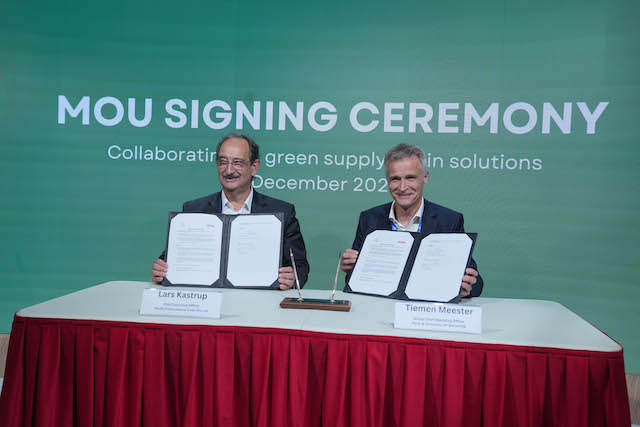Pacific International Lines (PIL) and DP World have signed a Memorandum of Understanding (MOU) to jointly develop green solutions to decarbonise global supply chains.
The agreement pairs DP World, which handles around 10% of the world’s container trade, and PIL, a leading Singapore-based shipping company. By leveraging each other’s strengths and expertise, the companies can help to accelerate progress towards their common target of net zero GHG emissions
In the near term, both parties will collaborate on trial shipments between Jebel Ali Port in Dubai and destinations within PIL’s network, with initiatives to reduce the shipments’ GHG footprint. This will include shipments on PIL’s vessels powered by a biofuel blend, biofuel bunkering, and deploying container handling equipment at terminals that run on renewable energy to handle the shipments.

Over the longer term, the companies will explore expanding this partnership to include other ports within DP World’s global network, and using other alternative fuels, such as e-LNG, green methanol or green ammonia in PIL’s vessel operations and bunkering.
Lars Kastrup, Chief Executive Officer, PIL said, “Supply chain resilience and sustainability is the bedrock of global trade growth. With the renewed commitment by the International Maritime Organisation (IMO) this year to take a significant step forward to decarbonise the shipping industry, we at PIL are responding actively to IMO’s call and working to invest in and implement green solutions to achieve our target of achieving net zero by 2050. In this regard, we are pleased to have DP World joining us on our sustainability journey. Capitalising on the combined strengths of our two organisations, we can both augment our sustainability efforts as we co-develop solutions to decarbonise our supply chains.”
Tiemen Meester, Group Chief Operating Officer, Ports & Terminals, DP World, said, “Decarbonisation is the single biggest concern for DP World outside the constraints and the physical movement of goods. So, we are transforming our business and the impact global trade has on the climate. We have already committed to becoming carbon-neutral by 2040 and achieving net-zero carbon emissions by 2050. But we must explore partnerships with companies that share our ambitions and technology to be deployed right now for quicker results.”











